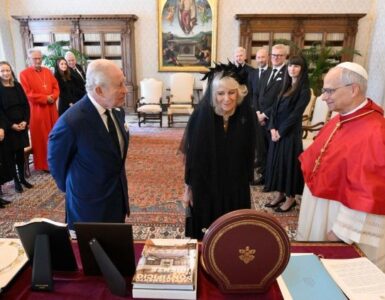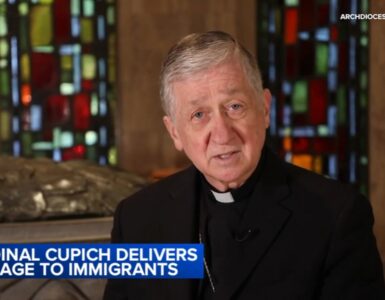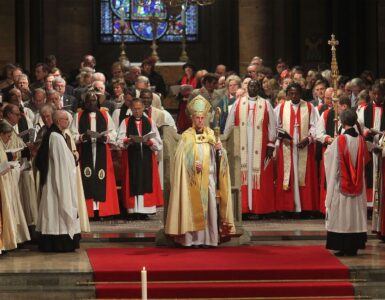Roman Catechism Series
Editor’s Note: CFN is excited to re-introduce this series which covers the entire Roman Catechism. This series was first presented in earlier editions of the monthly paper. The author, Mr. Matthew Plese, is a traditional Third Order Dominican who resides in Chicago, IL. After entering the Church with his family in 2004 as a high school freshman, he went on to earn degrees in Business and Philosophy as well as a Certificate in Catechesis from the Catholic Distance University. Since 2010, Mr. Plese has served as the president of CatechismClass.com, an online apostolate devoted to providing top-quality sacramental preparation and other religious education resources for individual and parish use. Readers can follow Mr. Plese online by visiting his blog, A Catholic Life http://www.acatholiclife.blogspot.com
The Necessity of Faith and Apostolic Origin of the Creed
By Matthew Plese
The Necessity of Faith
“O my God, I firmly believe that You are one God in three divine Persons, Father, Son, and Holy Ghost. I believe that Your divine Son became man and died for our sins, and that He will come to judge the living and the dead. I believe these and all the truths which the holy Catholic Church teaches, because in revealing them You can neither deceive nor be deceived.”
This short but powerful Act of Faith is a prayer that all young Catholics learn. But how often do we reflect on it in our daily life? Do we make this Act of Faith along with an Act of Hope and Act of Charity each morning with our morning prayers? Or has it fallen by the wayside amidst the busyness of life? Do we even know what “faith” means?
The Roman Catechism is a powerful compendium of the Church’s teachings and a treasure to all – especially to those of us in the modern world who have witnessed the widespread crisis of Faith over the past 50 years. Through the wisdom of Holy Mother Church, after outlining the reasons for this single volume catechism, she begins with an overview of Faith, its necessity, and the origins of the Apostles’ Creed. The Roman Catechism plainly asserts in this first section: “In preparing and instructing men in the teachings of Christ the Lord, the Fathers began by explaining the meaning of faith. Following their example, we have thought it well to treat first what pertains to that virtue… we here speak only of that faith by which we yield our entire assent to whatever has been divinely revealed.”
According to the Modern Catholic Dictionary by Fr. John Hardon, S.J., faith is “the acceptance of the word of another, trusting that one knows what the other is saying and is honest in telling the truth. The basic motive of all faith is the authority (or right to be believed) of someone who is speaking. This authority is an adequate knowledge of what he or she is talking about, and integrity in not wanting to deceive. It is called divine faith when the One believed is God, and human faith when the persons believed are human beings.”[1] Thus, when we speak of faith in God or faith in the teachings of the Catholic Church, it is not a mere aspiration or dream; rather, it is a sure and firm belief in something objectively true. Although we cannot scientifically demonstrate all the dogmas of Faith, our belief is not based on emotions or convictions; rather, in the words of Pope St. Pius X, “faith is a genuine assent of the intellect to truth received by hearing from an external source” – namely, from God (Oath Against Modernism).
Concerning the virtue of Faith, the Catechism of St. Thomas Aquinas, composed by the Angelic Doctor himself, expounds on this notion when he writes, “The first thing that is necessary for every Christian is faith, without which no one is truly called a faithful Christian.” To be a Christian it is necessary to possess faith – faith in God and in all that His Holy Church teaches. Those who reject certain dogmatic teachings (e.g. Purgatory, the necessity of confessing one’s sins to a priest, Transubstantiation, etc.) reject the entirety of the Faith since to reject part of what is necessary for salvation is to reject it wholly. To be a Catholic, one must profess faith in all that the Church teaches, since to reject one dogma is to reject them all, as St. Thomas explains: “…a heretic with regard to one article has no faith in the other articles, but only a kind of opinion in accordance with his own will.”[2]
According to the Church’s Code of Canon Law:
“A person must believe with divine and Catholic faith all those things contained in the word of God, written or handed on, that is, in the one deposit of faith entrusted to the Church, and at the same time proposed as divinely revealed either by the solemn magisterium of the Church or by its ordinary and universal magisterium which is manifested by the common adherence of the Christian faithful under the leadership of the sacred magisterium; therefore all are bound to avoid any doctrines whatsoever contrary to them…therefore, one who rejects those propositions which are to be held definitively is opposed to the doctrine of the Catholic Church.”[3]
To obstinately deny or doubt even one divinely revealed truth is to fall into the mortal sin of heresy – a sin that requires not only sacramental Confession but also a repudiation of the false teaching and a return to harmony of belief with the truth as taught by Holy Mother Church.
St. Thomas continues his discussion on Faith by pointing out its four effects:
“The first is that through faith the soul is united to God, and by it there is between the soul and God a union akin to marriage…The second effect of faith is that eternal life is already begun in us; for eternal life is nothing else than knowing God…The third good that comes from faith is that right direction which it gives to our present life. Now, in order that one live a good life, it is necessary that he know what is necessary to live rightly; and if he depends for all this required knowledge on his own efforts alone, either he will never attain such knowledge, or if so, only after a long time. But faith teaches us all that is necessary to live a good life…The fourth effect of faith is that by it we overcome temptations: The devil would have us disobey God and not be subject to Him. This is removed by faith, since through it we know that He is the Lord of all things and must therefore be obeyed.”[4]
Faith is necessary for salvation, for it is by faith that we attach ourselves to all that God has revealed for our salvation. The Roman Catechism continues by its succinct but clear affirmation: “That faith thus understood is necessary to salvation no man can reasonably doubt, particularly since it is written: Without faith it is impossible to please God [Heb. 11:6].”
Faith Alone is Insufficient
While faith is necessary for salvation, the intellectual assent to God’s existence and revelation is not enough, in and of itself, to save a man. “Thou believest that there is one God. Thou dost well: the devils also believe and tremble,” says St. James in his Epistle (Jam. 2:19). A man could certainly believe in God, be baptized, and then live a life of sin which would condemn his soul to hell. A man could also live a holy life for many years, but then give in to temptation, commit a mortal sin, and die separated from God. Those who claim otherwise fail to understand the malice of sin and forget that Our Lord will condemn those who merely give Him lip service (cf. Matt. 7:21). More than mere belief in our Divine Redeemer is necessary to save our souls, once again, as St. James testifies: “For even as the body without the spirit is dead, so also faith without works is dead” (Jam. 2:26). Catholics would do well to familiarize themselves with the Church’s timeless teachings on this matter.
When speaking of the Redemption, we begin with objective redemption, which deals with Christ. Objective redemption began when Christ was conceived and completed in His Resurrection. During that period, He fulfilled the prophecies of long ago and “was offered once to exhaust the sins of many,” that is, “for the destruction of sin by the sacrifice of Himself” (Heb. 9:28, 26). Three days later, He rose from the dead, and we, too, believe that if we die in Christ, we also will rise with Him (cf. 2 Tim. 2:11). This is a central truth of the Faith, one that is expressed in the Creed.
Subjective redemption, however, is also vitally important to the Christian faithful in reaching Heaven because even though Christ died for all, not everyone chooses to cooperate with God’s salvific will and thus be saved. In other words, there are people who reject Jesus and the Redemption He merited for us. Our Lord Himself alluded to this truth when He instituted the words of consecration for His Precious Blood, saying, “Take this, all of you, and drink from it, for this is the chalice of My Blood, the Blood of the new and eternal covenant, which will be poured out for you and for many for the forgiveness of sins.” Concerning this reality, St. Thomas comments: “The Blood of Christ has been shed for all concerning its sufficient power (quem ad sufficientam), but only for the elect as regards to its efficacy (quo ad efficiam).”
Christians have an obligation to grow in the Faith by following Christ in obtaining their salvation. We believe that salvation cannot be earned, but we do believe, as Catholics, that we have a responsibility to live a life of “faith that worketh by charity” (Gal. 5:6). Our Lord instructed the Apostles shortly before His Ascension, “Going therefore, teach ye all nations, baptizing them in the Name of the Father, and of the Son, and of the Holy Ghost. Teaching them to observe all things whatsoever I have commanded you: and behold I am with you all days, even to the consummation of the world” (Matt. 28:19-20). He never told His followers to merely believe, teach others to accept Him as their “personal Lord and Savior,” then return to their previous ways of living.
By God’s grace, we receive the gift of faith that allows us to believe. The works that we do, in turn, demonstrate our faith. Thus, we are saved by God’s grace (cf. Eph. 2:8), but His grace in us must not be void (cf. 1 Cor. 15:10). “For even as the body without the spirit is dead, so also faith without works is dead” (Jam. 2:26). Everyone, from the highest kings to the lowest servants, must put their faith into action in order to obtain salvation. “Wherefore, my dearly beloved,” says St. Paul, “as you have always obeyed, not as in my presence only, but much more now in my absence, with fear and trembling work out your salvation. For it is God Who worketh in you, both to will and to accomplish, according to His good will” (Philip. 2:12-13).
Some Protestants will counter with Romans 3:28: “For we account a man to be justified by faith without the works of the law.” Notice, however, that St. Paul did not say faith alone. In his German translation of the New Testament, Martin Luther added the word “alone” to the above verse in a shameful attempt to legitimize his heresy of sola fide. Ironically, the only verse in Scripture that features the phrase sola fide (“faith alone” or “faith only”) categorically rejects Luther’s heresy: “Do you see that by works a man is justified, and not by faith only?” (Jam. 2:24). This is why Luther contemptuously referred to the Epistle of St. James as the “epistle of straw.”

Faith and Works: Harmonizing Paul and James
To account for the apparent (not real) contradiction between St. Paul’s Epistle to the Romans and the Epistle of St. James, we must understand that St. Paul, in Romans, is talking about the works of the law required by the Jewish faith. In addition to the Ten Commandments, the Jews were required to follow hundreds of other legal prescripts ranging from liturgical and dietary laws to the wearing of tassels on their cloaks. According to a strict interpretation of the Mosaic law, something as small as lighting a fire in one’s home on the Sabbath would break the law (cf. Ex. 35:3). For St. Paul, the former Pharisee, the debate is obviously not about Catholic versus Protestant, but about Jewish versus Gentile and the requirements under the New Covenant, which has replaced the Old Covenant.
Remember the words that Christ spoke during His Sermon on the Mount: “So let your light shine before men, that they may see your good works, and glorify your Father Who is in heaven” (Matt. 5:16). So must we, with a sincere heart, have works that glorify God. Our works will be an outward expression of our Faith, for faith without works is indeed dead. Long before the Protestant revolt, St. Anthony of Padua (1195-1231) asserted inspired words which surely apply to us in the 21st century: “Actions speak louder than words; let your words teach and your actions speak. We are full of words but empty of actions, and therefore are cursed by the Lord, since He Himself cursed the fig tree when He found no fruit but only leaves. It is useless for a man to flaunt his knowledge of the law if he undermines its teaching by his actions.”[5]
The Creed
After establishing the necessity of faith and its unity, the Roman Catechism continues with an overview of the Apostles’ Creed. A creed is a summary or statement of what one believes. “Creed” comes from the Latin credo, which means I believe; that is, I accept or hold true something on the word of another. A creed, in the Catholic sense, is not a product of human wisdom expressing subjective opinions. It is a systematic statement of divinely revealed truths.
The Apostles’ Creed is a series of twelve truths about God, the Trinity, and the Catholic Church that He founded. The Roman Catechism summarizes for us the origin of the Creed in its introduction: “Now the chief truths which Christians ought to hold are those which the holy Apostles, the leaders and teachers of the faith, inspired by the Holy Ghost, have divided into the twelve Articles of the Creed. For having received a command from the Lord to go forth into the whole world, as His ambassadors, and preach the Gospel to every creature, they thought it advisable to draw up a formula of Christian faith, that all might think and speak the same thing, and that among those whom they should have called to the unity of the faith no schisms would exist, but that they should be perfect in the same mind, and in the same judgment.”
The Apostles’ Creed sums up in one prayer all that we believe as Catholics. The Creed has come down to us from apostolic times and contains a summary of the principal truths taught by the Apostles. All the truths of our Faith are contained in the Creed, albeit in a compressed and reduced form. To memorize, study, and internalize the Creed is to intellectually and spiritually unite ourselves to the mission of the Church.
We begin the prayers of the Holy Rosary with the Apostles’ Creed. We also commit to the content of the Creed when we are baptized, whether personally (if above the age of reason) or through the promises that our godparents make on our behalf.
The Creed gives us a breakdown of all that we believe, and by studying it line by line we gain insight into who God is and what He expects from us, His creatures. When we say the Apostles’ Creed, we are making an Act of Faith. We are professing to hold as true the words that we recite. And just as we should start each day with such an Act of Faith, we confirm our Act of Faith in our daily actions by living in conformity with the commandments and with the conscious awareness that we are missionaries in our world today. We are the hands and feet of Our Lord. If people see our actions, would they be inspired to join or re-join the Catholic Faith?
St. Charles Borromeo, pray for us!
Subscribe to the paper and get access to premium video content, lectures and more!
Or subscribe to the physical edition: https://simplecirc.com/subscribe/17820213

[1] Fr. Hardon’s entire Modern Catholic Dictionary is available online at http://www.therealpresence.org/dictionary/adict.htm.
[2] Summa Theologiae II-II, q. 5, art. 3 (http://www.newadvent.org/summa/3005.htm#article3).
[3] 1983 Code of Canon Law, Can. 750 §1-2 (http://www.vatican.va/archive/ENG1104/__P2H.HTM).
[4] The Apostles’ Creed by St. Thomas Aquinas (trans. Joseph B. Collins), New York, 1939.
[5] June 13th entry in Catholic Mom’s Cafe: 5-Minute Retreats for Every Day of the Year by Donna-Marie Cooper O’Boyle.




